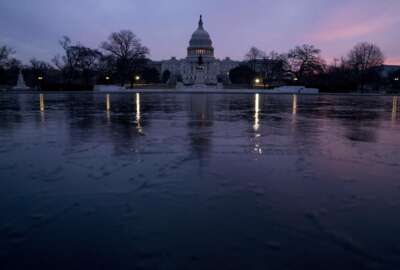
What if they had a shutdown and nobody shutdown, or noticed?
The government shutdown clock is ticking and almost nobody wants one, although the president did say he would be “proud” to do it if Congress doesn’t approve...
Years ago a colleague left the high-stress world of The Washington Post for what he thought would be a more peaceful time in the academic world. He became a professor at a local and very expensive Washington, D.C. university.
Over the occasional catch up lunch I would tell him about life in the newsroom and he would regale me with what was happening in his new place. There was much jockeying for position and status. He said people at his new office were easily offended and jealous if one of their peers got a perceived break. He told about a battle between two male professors — of journalism yet — over who had the biggest Rolodex!
Fast forward to now. The government shutdown clock is ticking and almost nobody wants one, although the president did say he would be “proud” to do it if Congress doesn’t approve the full $5 billion he says is needed to complete our urban renewal project with Mexico. Many congressional Republicans oppose the idea, perhaps knowing, if history is any judge, that the public will blame the GOP if a shutdown closes popular tourist attractions during the holidays, including Washington’s free federal museums. Some Democrats, while protesting, probably hope for a short, highly-visible shutdown to stick it to the opposition.
But what about the people most affected by a shutdown? These are federal workers told to stay home, federal workers who will work regardless and the public itself?
So what if there is a shutdown and hardly anybody outside the media knows, or cares?
Reader M.G., a career fed and veteran of shutdowns past, had this to say:
“Look at the reality of the situation. First, only about 25 percent of the government agencies do not have their funding so the raw numbers of feds out of work is much lower than with past shutdowns. Second, a good percentage of the workers who would be impacted by a shutdown are essential and will have to work anyway. Finally, most folks these days do their Christmas shopping with credit cards. If you are forced to stay home, you are free to shop as long as the ‘eventually get paid’ money comes before the credit card bill comes due.”
A long-time worker at the Department of Homeland Security who is designated “emergency” (as in must-work), said this:
“This shutdown, if it happens, will be different. It will impact fewer agencies and fewer people. Look at the Federal News Network story on Monday. It shows which agencies would be impacted and which not. Some of the government ‘giants’ like [the] Defense and Treasury [departments], [Department of Health and Human Services] and the [Department of Veterans Affairs] already have their budgets. That leaves [the departments of] Commerce, Justice and Interior, the Environmental Protection Agency, Agriculture [Department], Food and Drug Administration, [the departments of] Transportation and Housing and Urban Development, and my department, DHS, to ‘participate’ in a shutdown. Huge chunks of those departments, especially including Justice and DHS, will be on duty as per usual. So where’s the shutdown? Where, as they used to say, is the beef?”
Holy cow, could they be right, a shutdown where hardly anybody shuts down?
Nearly Useless Factoid
By Amelia Brust
Thomas Edison’s assistant, Edward Johnson, came up with the idea of electric lights for Christmas trees in 1882 while he was vice president of the Edison Electric Light Company. Christmas tree lights were first mass-produced in 1890.
Source: University of Illinois Extension
Copyright © 2025 Federal News Network. All rights reserved. This website is not intended for users located within the European Economic Area.
Mike Causey is senior correspondent for Federal News Network and writes his daily Federal Report column on federal employees’ pay, benefits and retirement.
Follow @mcauseyWFED




